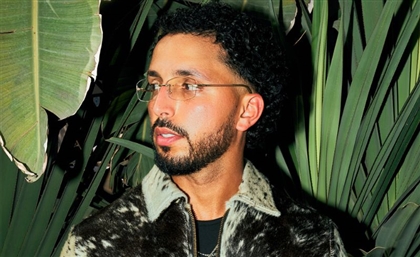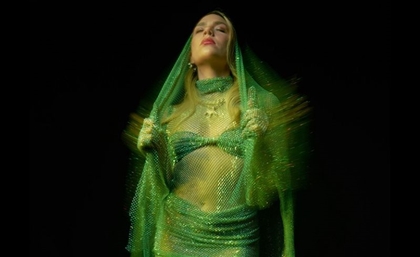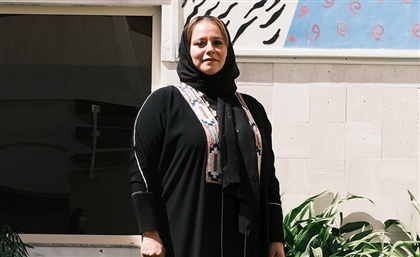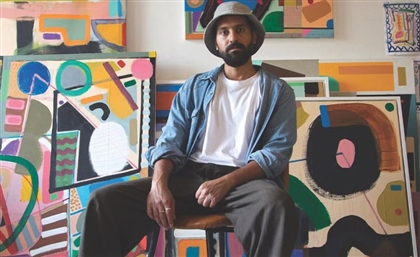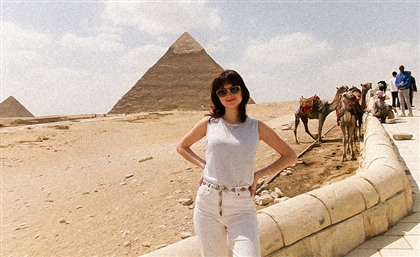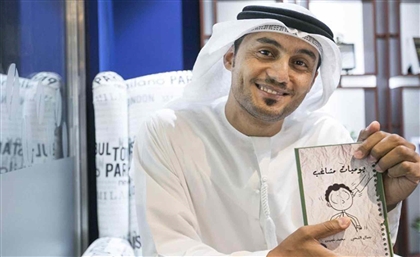Nicolas Mouawad Lives for the Role Not the Rerun
Despite a résumé that includes prophets, kings, and the burdened overthinker, Nicolas Mouawad insists his acting career was an accident.
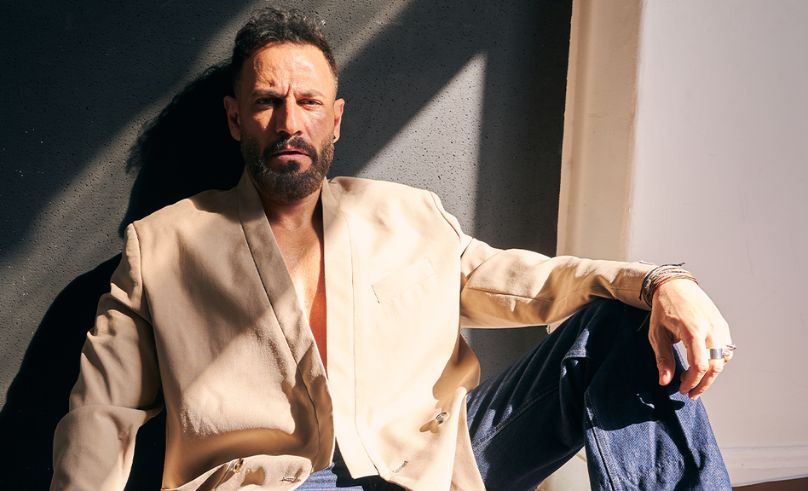
When Lebanese actor Nicolas Mouawad isn’t toggling between an alarming range of linen shirts as the perennially anguished Karam in Al Thaman - a melodrama known to cause emotional vertigo and the spontaneous drafting of 3am texts you’ll later deny - he’s singing in Turkish. In a tuxedo. Beside, naturally, Turkish singer Aylin Yeliz.
For a brief but magical moment, he was also exceptionally easy to find - just follow the faint aroma of Earl Grey along the Australian coastline. There, in what was possibly the last functioning civilisation on Earth in the thick of the Covid-19 pandemic, Mouawad was seen in animated conversation with Mad Max director George Miller, Idris Elba, and Tilda Swinton. Whether they were dissecting the nuances of cinematic apocalypse or debating which edition of Stanislavski’s ‘An Actor Prepares’ offers the most existential bite remains unclear. What is clear, however, is that Three Thousand Years of Longing - a harrowing supernatural tale film starring all three - debuted shortly thereafter. Interpret that as you will. Nicolas certainly would.
-f40ef172-4738-4ed9-ab47-91616d730d24.jpg) He’s very reachable - available on WhatsApp with the ease of a friend abroad who texts back promptly, punctuates liberally with red heart emojis, and deploys exclamation marks with the unapologetic gusto of someone unburdened by irony. Correspondence definitely doesn’t feel like liaising with a screen actor. And it's all intentional.
He’s very reachable - available on WhatsApp with the ease of a friend abroad who texts back promptly, punctuates liberally with red heart emojis, and deploys exclamation marks with the unapologetic gusto of someone unburdened by irony. Correspondence definitely doesn’t feel like liaising with a screen actor. And it's all intentional.
Despite a résumé that includes prophets, kings, narcissists, and the occasional romantically burdened overthinker, Nicolas Mouawad insists his acting career began more or less by accident. “I never wanted to be in front of the camera,” he explains. “I was shy. I loved math. I watched Spartacus with my dad on Sundays. That was the gateway drug.”
-239cf932-03d4-41a6-8911-39c87c05c7ea.jpg) It tracks. A child quietly obsessed with physics, but emotionally destabilised by 1960s gladiator cinema, grows up to master four languages and cry convincingly on cue. The acting epiphany arrived, predictably, via Shakespeare. Mouawad found himself performing Richard III at university and walked off stage a changed person. “It was the first time I felt that kind of electricity,” he says. “A beautiful, terrifying kind of joy.” He didn’t run off to L.A. or start referring to himself in third person. Instead, he did what any dutiful Lebanese son with theatrical leanings and anxious parents would do: he double-majored in civil engineering and theatre. Because in the Arab world, emotional expression is important - but so is concrete income.
It tracks. A child quietly obsessed with physics, but emotionally destabilised by 1960s gladiator cinema, grows up to master four languages and cry convincingly on cue. The acting epiphany arrived, predictably, via Shakespeare. Mouawad found himself performing Richard III at university and walked off stage a changed person. “It was the first time I felt that kind of electricity,” he says. “A beautiful, terrifying kind of joy.” He didn’t run off to L.A. or start referring to himself in third person. Instead, he did what any dutiful Lebanese son with theatrical leanings and anxious parents would do: he double-majored in civil engineering and theatre. Because in the Arab world, emotional expression is important - but so is concrete income.
What separates Mouawad from the method crowd is in part his growing international resume but predominantly his refusal to treat any character, no matter how ethically bankrupt, as a cautionary tale. “I never judge them,” he says. “Even if they’re manipulative or monstrous - I have to believe them. I have to understand them. Otherwise, no one else will.” It sounds noble, and it is, but it also involves the kind of emotional mining that would make your therapist visibly sweat.
-1b26cc0e-62bc-4285-ab98-a1ec001ce442.jpg) This intensity comes with a cost. When playing Karam, a man diagnosed with cancer in Al Thaman, Mouawad drew from his own life: both of his parents died of the same illness. “It was brutal,” he says. “I had to go back there emotionally.” Later, in one of the many side conversations this question then prompted, he added quietly, “Being an actor, sometimes, is not healthy.” The comment was tossed off like a fact - like calling a double espresso strong - but it stuck.
This intensity comes with a cost. When playing Karam, a man diagnosed with cancer in Al Thaman, Mouawad drew from his own life: both of his parents died of the same illness. “It was brutal,” he says. “I had to go back there emotionally.” Later, in one of the many side conversations this question then prompted, he added quietly, “Being an actor, sometimes, is not healthy.” The comment was tossed off like a fact - like calling a double espresso strong - but it stuck.
The truth is, the body doesn’t always know the difference between grief remembered and grief rehearsed. Some roles linger like old bruises. His portrayal of Abraham in His Only Son stayed long after the cameras stopped. “I wanted him to feel human,” Mouawad explains. “Not untouchable. Not mythic. Just a man doing what he believes is right - and barely holding it together while doing it.”
-823c2ae4-97f4-4139-b404-1809b9b92dd3.jpg) Grief isn’t the only thing that sticks. Fame does too - trailing him with the persistence of an overdue utility bill. He swears he doesn’t enjoy recognition. “I like the work. Not the noise,” he shrugs.
Grief isn’t the only thing that sticks. Fame does too - trailing him with the persistence of an overdue utility bill. He swears he doesn’t enjoy recognition. “I like the work. Not the noise,” he shrugs.
He splits his time between Lebanon, Egypt, Istanbul, and whichever city has most recently asked him to learn an entirely new alphabet. He acted in Russian, sung in Turkish, and delivered lines in Arabic, English, and what can only be described as the universal dialect of beautifully managed despair. “I’m not doing this to impress anyone,” he says. “I just get bored easily. Learning keeps me awake.”
Mouawad claims to have little interest in being “known,” which is a curious position for someone regularly recognised in public and aggressively complimented in grocery stores. “I never feel established,” he admits. “Even when people say it, I don’t believe it. My mind’s always in rehearsal for something else. I can’t afford to stand still. I’m afraid if I stop, I’ll start believing my own bio.”
-9dd8aa14-7d94-4ab4-973e-2f1a67a8c808.jpg) Still, he’s learned the art of pressing pause. After three projects back-to-back, he’s taken a self-imposed sabbatical. “No scripts. No shoots. Nothing for four or five months,” he tells me. “I want to be home.” By “home,” he means with his wife and young daughter, who recently joined him for a six-month shoot in Istanbul.
Still, he’s learned the art of pressing pause. After three projects back-to-back, he’s taken a self-imposed sabbatical. “No scripts. No shoots. Nothing for four or five months,” he tells me. “I want to be home.” By “home,” he means with his wife and young daughter, who recently joined him for a six-month shoot in Istanbul.
Fatherhood has recalibrated him. The provocateur is still there - “If everyone says they love white, I’ll say I love black” - but so is the softness that comes with realising you are now the person someone else will remember as their childhood. “She won’t be little forever,” he says. “And I don’t want to be the guy who sends a teddy bear from set and calls it parenting.” When I ask what he’d say if, twenty years from now, she told him she wanted to act, he doesn’t flinch. “I’d be her biggest supporter. Because I know exactly what it feels like to not have one.”
-9d45932d-3f03-4a63-9058-a82a17847f5b.jpg) Of course, all of this - fatherhood, fame, the Turkish ballads - sits in tension with how the public imagines him. “People think they know me because they’ve seen me cry on TV,” he says. “But they don’t know who I am at 2 AM, when everyone’s asleep and it’s just me and the noise inside my head.”
Of course, all of this - fatherhood, fame, the Turkish ballads - sits in tension with how the public imagines him. “People think they know me because they’ve seen me cry on TV,” he says. “But they don’t know who I am at 2 AM, when everyone’s asleep and it’s just me and the noise inside my head.”
So who is that person, we ask. He pauses, then offers a half-smile.
“A dreamer. With insomnia.”
- Previous Article Greek Chain Crepa Crepa Flips Its Way Into Abu Dhabi
- Next Article Six Unexpected Natural Wonders to Explore in Egypt
Trending This Week
-
Dec 27, 2025








